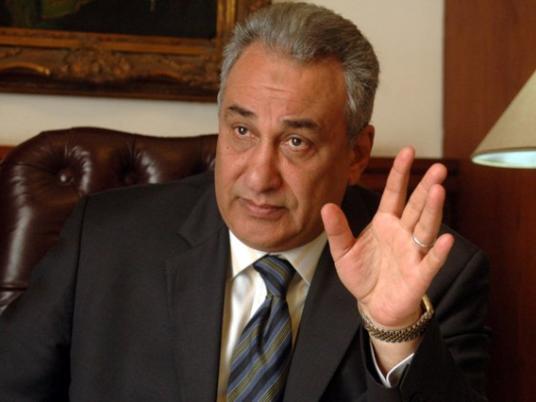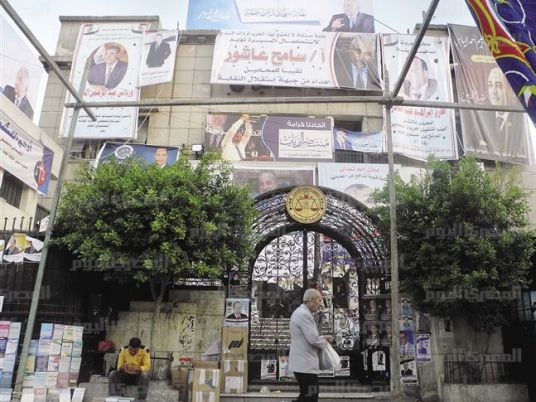Chairman of the Democratic Arab Nasserite Party Sameh Ashour won the seat of chairman in Lawyers Syndicate elections on Monday. He won by 17,000 votes against his closest rival, Wafd Party Chairman Mohamed Kamel, who was backed by the Muslim Brotherhood (MB).
Ashour won 37,597 out of the total 90,706 votes on Sunday, while Kamel won 19, 817 votes.
The elections are the first Lawyers Syndicate elections to take place following the uprising in January, after which a court injunction ordered the dissolution of the Syndicate Board in July. The court order came following a lawsuit claiming the invalidity of the syndicates’ 2009 elections in which Hamdy Khalifa, who was supported by the defunct National Democratic Party, won against Ashour. At the time, most syndicate members doubted the election’s integrity.
According to the syndicate's internal rules, the governing council should consist of a chairman and 44 other members. Twenty-six candidates are running for chairman in the upcoming elections, with 399 others competing for council member seats.
The MB announced it will not nominate any of its members for the chairmanship, and will only compete for membership seats on the council. This decision mirrors the group's usual political tactics, whereby it depends on a large number of members to dominate an organization without contending its leadership.
Several days prior to the elections, the group announced its support for Kamel, following conflicted reports surrounding which candidate it would support. Some press reports pointed to the possibility they would support an Islamist for the post.
Ashour told Al-Masry Al-Youm: "The results are no surprise. The MB always imagined it had the ability to cause one candidate to win over the other, but the truth is that it's an organized minority and that the General Assembly's decision was decisive when it voted for the active party from its point of view."
Ashour, who previously served as Syndicate Chairman in 2001 and 2005, said the fact that all syndicate members participated in the elections and headed to the polling stations was decisive in preventing the MB from controlling the votes.
Islamist nominees Mokhtar Nooh and Montaser al-Zayat – the latter a Jama’a al-Islamiya lawyer – came in third and fourth in the elections, with17,055 and 10,825 votes respectively, while the remaining votes went to relatively unknown candidates. None of the candidates for the position of chairman showed up at the syndicate on Monday, with the exception of Ashour. A large number of MB lawyers were also missing.
Syndicate Activist Ahmed al-Gawad said the results were logical since none of the nominees were involved in syndicate work, with the exception of Ashour, who has had a prominent role in past years, even though he did not serve the syndicate in any official capacity.
"As members of the General Assembly, we found the MB’s remarks to be provocative. Its leadership said it had the ability to make any candidate win through their voting power," he said.
Meanwhile, all syndicate members said the elections passed quietly and with transparency. There was no suspicion of rigging, despite the lack of security following ongoing violence in Egypt over the past two days. A number of judges had been assigned by the Administrative Prosecution to supervise the voting process.
Ashour told Al-Masry Al-Youm that his first course of action following his appointment as chairman would be to call for the General Assembly to convene to discuss his ideas concerning the increase of lawyers’ pensions.
Ashour went on to say that one of the most important things he will begin working on is the drafting of a new bar law, in light of the current crisis between the Judges Club and the Lawyers Syndicate over draft amendments to Judicial Authority Law 142/2006. The lawyers say the new law drafted by a Ministry of Justice committee includes articles that reduce powers of attorney and lawyers immunity.
The recent disputes between judges and lawyers resulted in many Egyptian courts closing their doors in protest against the strike organized by a number of lawyers working to protest the law, forcing the government to defer consideration of the law until a new parliament is elected.
The winners of seats on the Syndicate’s Board are expected to be announced tonight or Tuesday morning. There are three main lists, considered to be the most prominent in the electoral race for syndicate board seats, including one for the MB, one for Ashour and one consisting of a set of novel syndicate activists who emerged following the January uprising.
The syndicate election this year may have a strong impact on the writing of Egypt's new constitution, explaining why so much energy is being poured into the upcoming syndicate election.
After the upcoming parliamentary elections, the ruling Supreme Council of the Armed Forces is to choose a 100-member constituent assembly that will write the new constitution. While the assembly is expected to be mostly comprised of elected members of parliament, it will likely include representatives from among other communities, including religious institutions, political parties, unions and syndicates.



